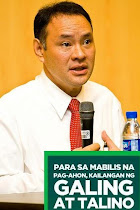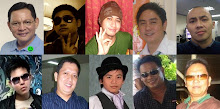 (In order to strengthen Gibo's platform for governance, I have substantiated the many salient points of his plans, in terms of structural reform, once he becomes elected as President)
(In order to strengthen Gibo's platform for governance, I have substantiated the many salient points of his plans, in terms of structural reform, once he becomes elected as President)Charter Change has always been at the forefront of many congressional, senatorial and national debates. Some have even taken the street in an effort to enact changes to the present mode, through People's Initiative. Many congressmen have actually already lobbied to have as ConAss as the mode for Charter Change, while there are some who have clamored for ConCon in line with the 2010 National Elections. Timing has also been one of the issues part of the Charter Change, since many deem it is one of the measures that PGMA supports for the sake of political survival.
However, the mode, the timing, the people involved... these are merely sub-issues. The real issue is what needs to be changed in the constitution, and what idea(s) must be promulgated in the next Charter to be enacted. In order for us to understand the whole picture, I will enumerate some, if not all of the major frailties of the present Charter.
The 1987 constitution provides the answers to the pre-existing conditions prevalent at the time of its inception, especially as a reaction to the dictatorship of the Marcos administration. It provided an array of provisions that would entail checks and balances, accountability and transparency in governance, and basic human rights to free speech and expression. However, much as it provided solutions to such ails of the previous regime, it did not promote a culture of self-determination and a spirit of synergy for the country to move forward.
The 1987 constitution is a doctrine which fosters much economic protectionism, that it fails to determine the budding potential of a globally competitive Philippines through forging economic partnerships with other countries to better its financial standing with its neighbors. Foreign ownership, amongst many, was restricted, to allow Filipinos the opportunity to till and use its own land, public utilities and natural resources. We must admit that while we encourage internal investment and entrepreneurship, there is a growing clamor for more jobs and better income, one that the present constitution fails to answer because of its restrictive economic provision.
The 1987 constitution embarks to fund many channels of legislation, through 24 seats in the upper chamber and 250 seats in the lower house. The expanding bureaucracy only serves as a burden to the fiscal measures of government, and its productivity is often measured by quantity, and not quality.
Structural reform, especially in the age of information, is essential in moving forward in a democracy. We cannot simply sit on our laurels seeing our budget deficit to greater heights because of our failure to tap revenue generating schemes.
An efficient government is one that sees efficient work of institutions at least counter productive cost. Today, the bureaucracy only serves as an additional burden to taxpayers and a detriment to less government spending. This falls as a problem of limited political autonomy to local government units, where in local governments are generally considered falling under the executing branch, thus they share a big chunk of the General Appropriations Act, encouraging dependency and discouraging capacity building from the local standpoint.
Democracy is something we have long worked hard for, fought for, and for some Filipinos, died for. The 1987 constitution has already established and ensured that the existing conditions during the Marcos time will not happen again, intensified by our increased political awareness and capacity and freedom to assemble. However, in order for us to move forward, structural reform through Charter Change to institutionalize a system of economic freedom must be advanced, so that each Filipino would have greater access to better job opportunities and increased self-determination.
To cap it all off... "The idea of patriotism and nationalism doesn't confine itself in the Filipino's ability to raise the flag by fighting the oppressors of democracy, but it is also embedded in the reality that a Filipino must have the capacity to self-actualize, free from political and economic slavery."






0 comments:
Post a Comment